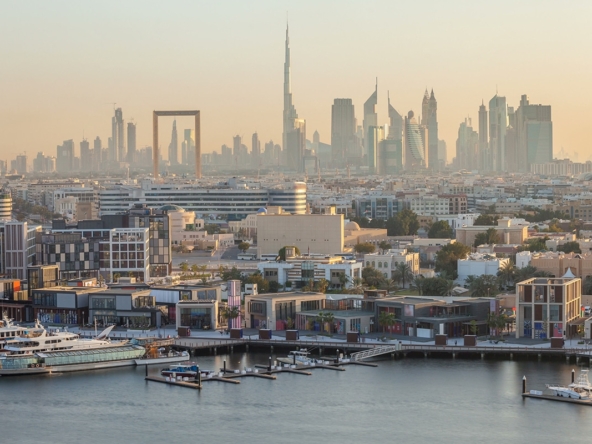REITs can serve as a strategic hedge against equity market volatility, often performing differently during market downturns.
In the booming landscape of Dubai’s property market, Real Estate Investment Trusts (REITs) continue to emerge as an accessible investment vehicle, offering small and first-time investors an entry point into the region’s real estate market.
Industry experts encourage this as an opportunity with low capital requirements and a method to gain passive income.
“One of the most significant benefits is the lower capital requirement, enabling investors to access the real estate market without the substantial upfront costs of purchasing a property. Additionally, REITs are highly liquid, as their shares can be traded on stock exchanges, unlike physical properties, which often take time to sell. Investors benefit from regular passive income, as REITs typically distribute a large proportion of their earnings as dividends,” said the Betterhomes Research Team in an exclusive interview with Arabian Business.
Traditionally, real estate investment has been characterised by high capital requirements and complex market dynamics. REITs, however, have presented a new segment by enabling investors to purchase shares traded on stock exchanges, these investment tools dramatically lower the financial threshold for market participation.
“The beauty of REITs lies in their democratisation of real estate investment,” explained the Betterhomes Research Team. Unlike direct property purchases that demand substantial upfront capital, REITs allow investors to gain exposure to diverse property portfolios with significantly reduced initial investments.
According to experts, there are several leading REITs in Dubai which focus on a wide array of property categories including commercial, retail and residential.
“In Dubai, prominent REITs like Emirates REIT, ENBD REIT, and Dubai Investments Real Estate Fund invest in a mix of commercial, retail, and residential properties. While these REITs are significant players, traditional real estate companies enhance the market with personalised services and local expertise,” said Rennie Sanger, sales manager, Off Plan & Investment at Haus & Haus.
The commercial sector remains the primary magnet for REIT investments, capitalising on Dubai’s reputation as a global business hub. Office spaces constitute a significant proportion of REIT portfolios.

However, the investment landscape is far from rigid. Educational and healthcare properties are “gaining traction for their stability”. The hospitality sector, supported by the city’s robust tourism industry, also presents investment opportunities through hotel and serviced apartment assets.
Compared to direct real estate investments like hotel apartments or villas, REITs offer a more balanced proposition. While hotel apartments can yield impressive returns during peak tourism seasons, they remain inherently volatile. Villas require substantial upfront investments and are similarly market-dependent.
“REITs generally offer a balance, with steady returns,” the research team said while Sanger argued that “traditional real estate investments offer greater control over property management and potential for higher long-term capital appreciation.”
This model typically distributes a significant proportion of earnings as dividends, offering investors consistent passive income streams.
“When comparing returns, REITs typically offer competitive returns and consistent income through dividends, appealing for regular cash flow,” Sanger said.
Although REITs can offer competitive returns and stable dividends, he stated that traditional investments can be more advantageous.
“Direct investments can yield higher long-term appreciation and tax advantages, such as depreciation. Investors should weigh their financial goals, risk tolerance, and investment horizon when choosing between REITs and traditional real estate, with REITs being suitable for those seeking liquidity and traditional investments appealing for long-term growth,” he explained.
However, real estate experts warned of challenges, as comes with most investment avenues.
“Market volatility can affect share prices, and the performance of REITs is closely tied to economic and geopolitical factors,” said the research team.
Dubai’s REIT market is susceptible to:
- Market volatility
- Economic and geopolitical fluctuations
- Potential interest rate shifts
- Regulatory changes in real estate legislation
“Rising interest rates may impact property values and increase borrowing costs for REITs, while regulatory changes in real estate laws or taxes can influence their profitability. Furthermore, REITs with portfolios concentrated in specific sectors or properties may expose investors to higher risks,” they added.
Investors are advised to conduct thorough due diligence and understand the potential risk factors.
The hidden strength of REIT, however, lies in portfolio diversification. These instruments allow investors to spread risk across multiple property sectors including commercial, residential, retail, and hospitality – and potentially even geographic regions.
“They allow investors to spread risk across various property sectors, including commercial, residential, retail, and hospitality, as well as geographic regions when international assets are included,” said the research team.
REITs can also serve as a strategic hedge against equity market volatility, often performing differently during market downturns.
“This diversification extends to investment types, balancing assets that provide steady income with those offering long-term appreciation potential. Additionally, REITs often act as a counterbalance to equities, performing differently during market downturns and providing a hedge,” they explained.

A unique aspect of Dubai’s REIT market is the availability of Shariah-compliant options. These investments adhere to Islamic financial principles, broadening the market’s appeal and accessibility.
Dubai-based REITs are particularly attractive, often delivering higher yields compared to more mature markets. This reflects the region’s dynamic growth potential and evolving real estate.
Earlier this year, Arabian Business reported that more Dubai investors are considering investments in Real Estate Investment Trusts at the highest recorded pace in history.
“Overall, REITs provide an accessible, diversified, and professionally managed avenue for investors to participate in Dubai’s thriving real estate market,” the research team concluded.



